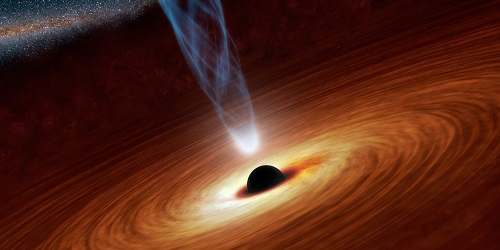New Physics Magnified in Spinning Black Holes
Quantum gravity refers to a group of theories—string theory, for example—that aims to reconcile the microscopic world of quantum physics with the macroscopic world of general relativity. Many experimental tests of quantum gravity have been proposed, but the relevant effects might be too tiny to detect. Now theoretical work by Grant Remmen at the University of California, Santa Barbara, and his colleagues shows that celestial objects called extremal Kerr black holes are highly sensitive to quantum gravity [1]. Precise observations of these bodies could therefore reveal evidence of new physics.
A Kerr black hole is a rotating, electrically neutral black hole. It is said to be extremal if it has the highest possible angular momentum that is compatible with its mass. Extremal Kerr black holes have yet to be detected, but many theories predict their existence.
Remmen and his colleagues point out that quantum corrections to general relativity would provide specific contributions to a quantity called the effective action, which describes the dynamics of a gravitational field. For an extremal Kerr black hole, these contributions are often assumed to be negligible, but the team shows that they would have a major impact on the body’s event horizon, the no-exit boundary that defines a black hole. Specifically, under quantum gravity, the event horizon would develop curvature singularities—regions where the gravitational field is infinitely strong.
The researchers say that the next step is to hunt for extremal Kerr black holes and to try to detect these curvature singularities through their effect on infalling matter.
–Ryan Wilkinson
Ryan Wilkinson is a Corresponding Editor for Physics Magazine based in Durham, UK.
References
- G. T. Horowitz et al., “Extremal Kerr black holes as amplifiers of new physics,” Phys. Rev. Lett. 131, 091402 (2023).




